How to Have Better Relationships by Understanding the Enneagram
What is the Enneagram? It is an ancient personality model, updated by psychologists in the Human potential movement. It describes how to understand our personality types, how to work with them and how improve the way we connect with others and operate in the world.
This is most helpful in relationships! Let’s understand How…….
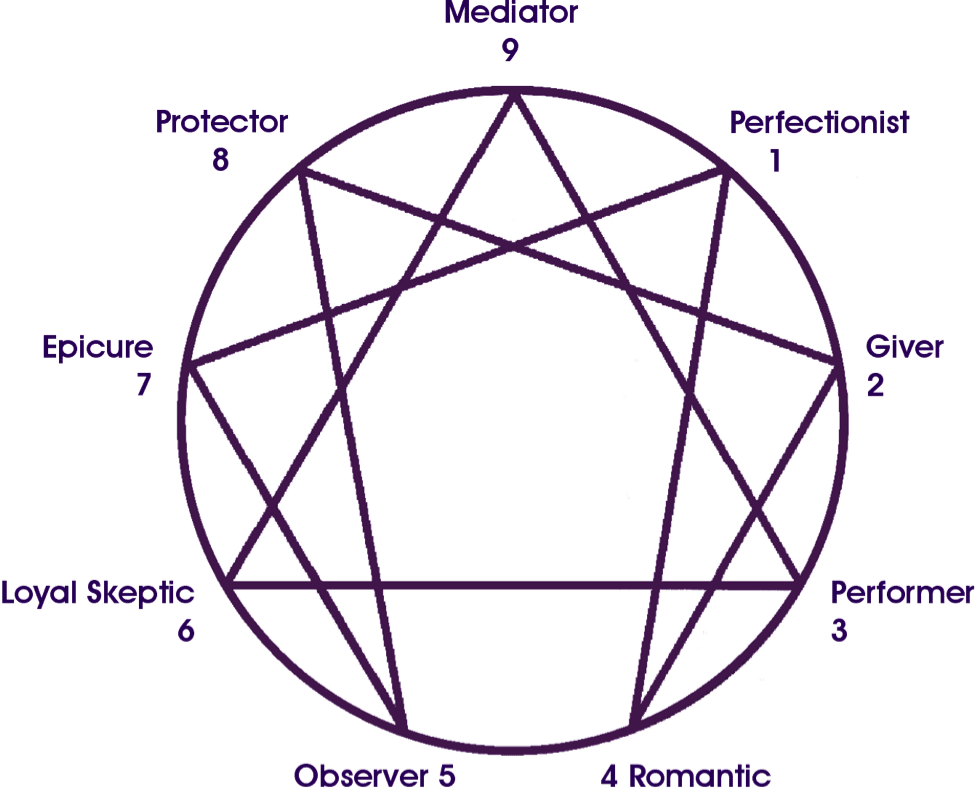
You can see that there are 9 types, and each type connects with other types.
Nine types
Each number has its “characteristic roles”. They also are connected by the lines of the enneagram figure to other types and these indicate what influences a person in more adverse or relaxed circumstances. For example, someone classed as a One type, may begin to think, feel and act more like a Four type when stressed, or more like a Seven type when relaxed.
Wings
Many people are also influenced by the two adjacent types as indicated on the enneagram figure. These two types are often called “wings”. A person of the Three personality type, for example, is understood to have points Two and Four as their wing types. A person may be understood to have a core type and one or two wing types that influence them but do not change their core type.
Lets Understand the Types!!
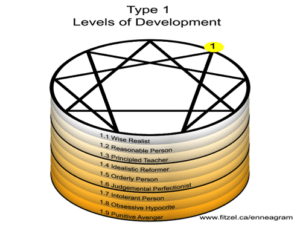 Type 1: The Reformer- Their basic need is to feel that all is in order.
Type 1: The Reformer- Their basic need is to feel that all is in order.
- They strive for perfection and to get things ‘right’ by trying to be rational, idealistic, principled, purposeful, and self-controlled.
- When relaxed they are great at working to make things happen well, and they can be playful.
- When stressed, feel that they are bad or wrong, or that things around them are not as they should be, they can become hypercritical, short-tempered, irritable and angry and controlling.
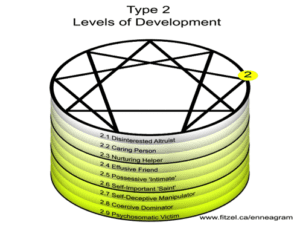 Type 2: The Helper -Their basic need is to be loved.
Type 2: The Helper -Their basic need is to be loved.
- In order to get love, they try to be very loving themselves.
- When relaxed they are genuinely caring, friendly, demonstrative, hospitable and generous.
- When stressed they can feel people-pleasing, ingratiating, possessive, clingy, hurt and resentful.
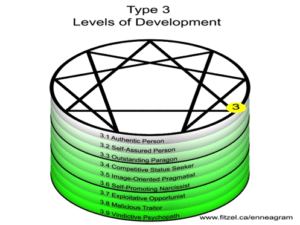 Type 3: The Achiever – Their basic need is to feel valuable.
Type 3: The Achiever – Their basic need is to feel valuable.
They strive to be seen as valuable and in order to display their worth they tend to be pragmatic, driven, and success-oriented.
When relaxed they are highly adaptive, often excelling in what they do
When stressed they are image-conscious, vain, approval seeking and push themselves to always “be the best”.
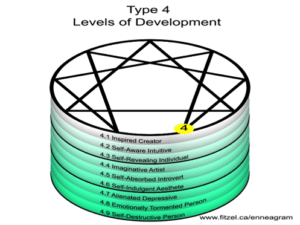 Type 4: The Individualist –Their basic need is to express their uniqueness.
Type 4: The Individualist –Their basic need is to express their uniqueness.
- They prove their significance to themselves and others through their creativity, artistry, expressive imagination and are often very talented.
- When stressed they can become overly sensitive, overly, dramatic, self-absorbed, withdrawn, fantasizing, melancholic and temperamental.
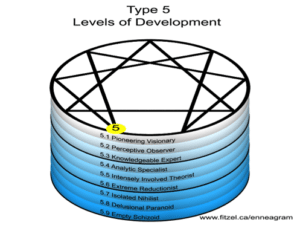 Type 5: The Investigator – Their basic need is to be masterful.
Type 5: The Investigator – Their basic need is to be masterful.
In order to Helplessness, Incapability, Incompetence
- Fives have felt grown up feeling like they needed to have their act together, and in order to guard against their fears helplessness or incapability, and incompetence they become intensely cerebral.
- Their strengths are that they are perceptive, innovative, often able to understand the patterns of things, and good problem solvers.
- When they are stressed they can be secretive, isolated, stingy, and resort to concepts instead of risking direct experience.
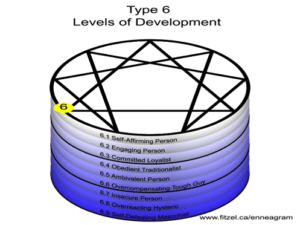 Type 6: The Loyalist – Their basic need is to feel like they are being supported.
Type 6: The Loyalist – Their basic need is to feel like they are being supported.
- They are great joiners and if they don’t find a group to join they will often help to create one that they feel will be supportive.
- Because they are security-oriented, they are engaging, loyal and responsible, and will be very committed to organizations that they feel are supportive of them..
- When they are stressed and they feel a lack of support, they can become anxious, fretful, cowardly and suspicious.
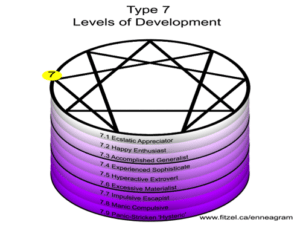 Type 7: The Enthusiast – Their basic need is to feel satisfied and content.
Type 7: The Enthusiast – Their basic need is to feel satisfied and content.
- Sevens love to be busy, and spontaneous. They are all about adventure, and they hate to feel trapped.
- When life feels good to them, they are versatile, fun loving, creative, and inspiring.
- But when they are stressed, they can be distracted, flaky, overextended, scattered and can spend an inordinate amount of time thinking the grass is greener elsewhere.
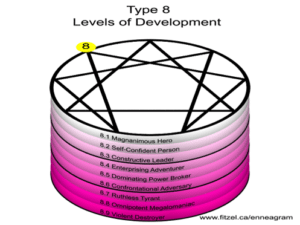 Type 8: The Challenger- Their basic need is to feel protected.
Type 8: The Challenger- Their basic need is to feel protected.
- Eights are the typical leaders of the pack, and like to feel completely self-sufficient. They have a fear of being harmed, controlled or violated by others.
- When everything in life is running smoothly for them, they are often powerful, self-confident, and decisive,
- When they are stressed they can become willful, dominating, and confrontational, vengeful, lustful and objectify others.
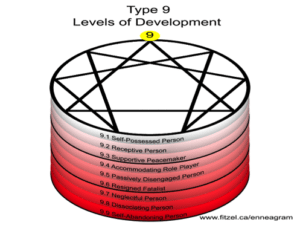 Type 9: The Peacemaker – Their basic need is for harmony and peace of mind.
Type 9: The Peacemaker – Their basic need is for harmony and peace of mind.
- Nine like everything around them to be in harmony and will often sacrifice their own needs to make this happen avoiding both conflict and self-assertion.
- When Nine’s are relaxed, they are easygoing, self-effacing receptive, reassuring, and agreeable and prone to daydreaming.
- When they are stressed they can become complacent, apathetic, lazy, depressed and at worst can feel separation and fragmentation.
So when you or your partner is acting out, ask yourself whether this might just be because that’s how your Enneagram type reacts to stress. Then you can address the real issue and not the symptoms. For example if your partner is Type 1, perhaps they are feeling out of control. Instead of ending up in a shouting match, you will probably see that they are overwhelmed and can help by showing them what is working in their world, and how to divide tasks into little chunks so things feel right and manageable for them. If they are Type 2 you experience hem as suddenly needy, then perhaps you can remind them that they are great just the way they are and that they don’t need reassurance from the outside in order to be the lovable selves they intrinsically are. You can do this in a loving way….or if you don’t, notice if you are feeling stressed and what you might need in the moment!
Share these insights with your partner and you will notice how much it really helps!!